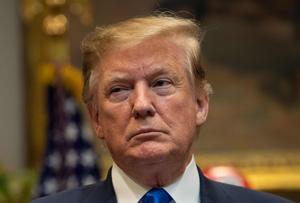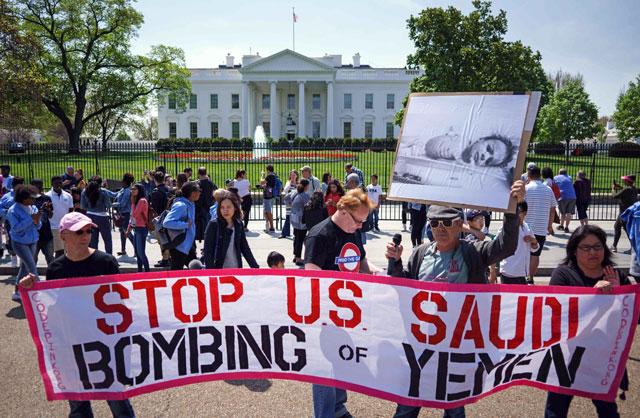You are here
Yemen's Houthi rebels say Trump veto proves US behind war
By AFP - Apr 17,2019 - Last updated at Apr 17,2019

In this file photo taken on April 12, 2019, US President Donald Trump looks on during an announcement about 5G network deployment in the Roosevelt Room at the White House in Washington, DC (AFP photo)
SANAA — Yemen's Houthi rebels Wednesday slammed US President Donald Trump's veto of a Congress resolution directing him to end support for the Saudi-led war in Yemen as proof Washington was behind the conflict.
The resolution had aimed to end US backing for a war that Democratic House speaker Nancy Pelosi labelled "a horrific humanitarian crisis", but Trump vetoed it, citing the security of Americans in the region.
Houthi spokesman Mohammed Abdelsalam Tweeted that Trump's veto Tuesday "proves that the United States is not only involved in the war on Yemen but also was behind the decision to go to war".
"Others followed that decision and execute the wishes and ambitions of the United States", Abdelsalam added, referring to Saudi Arabia and its allies.
Abdelsalam, who heads a rebel delegation involved in ongoing UN-led peace talks, held the US responsible for "massacres, crimes and the unjust siege of Yemen".
The US Congress' resolution on Yemen had taken the historic step of seeking to curtail a president's war-making powers, a step Trump condemned.
Trump said US support for the war between the Saudi-backed Yemeni government and Houthi rebels, who control the capital Sanaa, was necessary to "protect the safety of the more than 80,000 Americans who reside in certain coalition countries".
These countries "have been subject to Houthi attacks from Yemen," he said, referring to drone and missile strikes Saudi Arabia's air force either claimed were intercepted or denied altogether.
In March, Trump also overrode a congressional resolution that aimed to reverse the border emergency he had declared in order to secure more funding for his proposed wall between the United States and Mexico.
Yemen post-Khashoggi
The congressional resolution was a clear bipartisan rebuke to Trump, whose ties to Saudi Arabia have remained strong even following the murder of Saudi journalist Jamal Khashoggi, a Washington Post columnist and critic of powerful Crown Prince Mohammed Bin Salman.
Khashoggi was killed inside Saudi Arabia’s consulate in Istanbul. His murder sparked international condemnation of Saudi Arabia and thrust the Yemen war into the global spotlight.
Several countries have since suspended arms sales to Riyadh over its role in the conflict.
Democrats argue that US involvement in the Yemen conflict, which includes intelligence-sharing, logistical support and now-discontinued aerial refuelling, is unconstitutional without congressional authority.
Critics of the Yemen war warn Saudi forces are likely using US weapons to commit atrocities.
Washington’s involvement in Yemen long predates Trump.
The Saudi-led coalition launched its first raids on rebel strongholds on March 26, 2015 in a bid to bolster President Abed Rabbo Mansour Hadi, who now lives in Riyadh.
The US, which supported the coalition attacks, has also conducted drone strikes on suspected Al Qaeda targets in Yemen for over a decade.
While Saudi Arabia did not immediately react to the Trump veto, Saudi ally the UAE — which has US-trained boots on the ground in southern Yemen — hailed the move as a strategic “positive signal”.
The UAE minister of state for foreign affairs, Anwar Gargash, launded Trump’s statement as an “assertion of support to the Arab Coalition in Yemen is a positive signal of US resolve towards America’s allies”.
“President Trump’s important decision is both timely & strategic,” Tweeted Gargash.
Some 10,000 people have been killed in Yemen during the past four years, according to the World Health Organisation, although human rights groups say the toll could be five times higher.
The country stands at the brink of famine.
Both the Saudi-led alliance and the Houthis have been accused of acts that could amount to war crimes, while the coalition has been blacklisted by the United Nations for killing and maiming children.
Related Articles
ABU DHABI —The United Arab Emirates on Wednesday hailed as “strategic” President Donald Trump’s veto of a resolution from Congress directing
WASHINGTON — The US Senate on Wednesday dealt a stinging bipartisan rebuke to Donald Trump's foreign policy and his alliance with Riyadh, vo
WASHINGTON — Republican and Democratic US lawmakers will try again to pass a resolution ending US support for the Saudi-led coalition in Yem

















